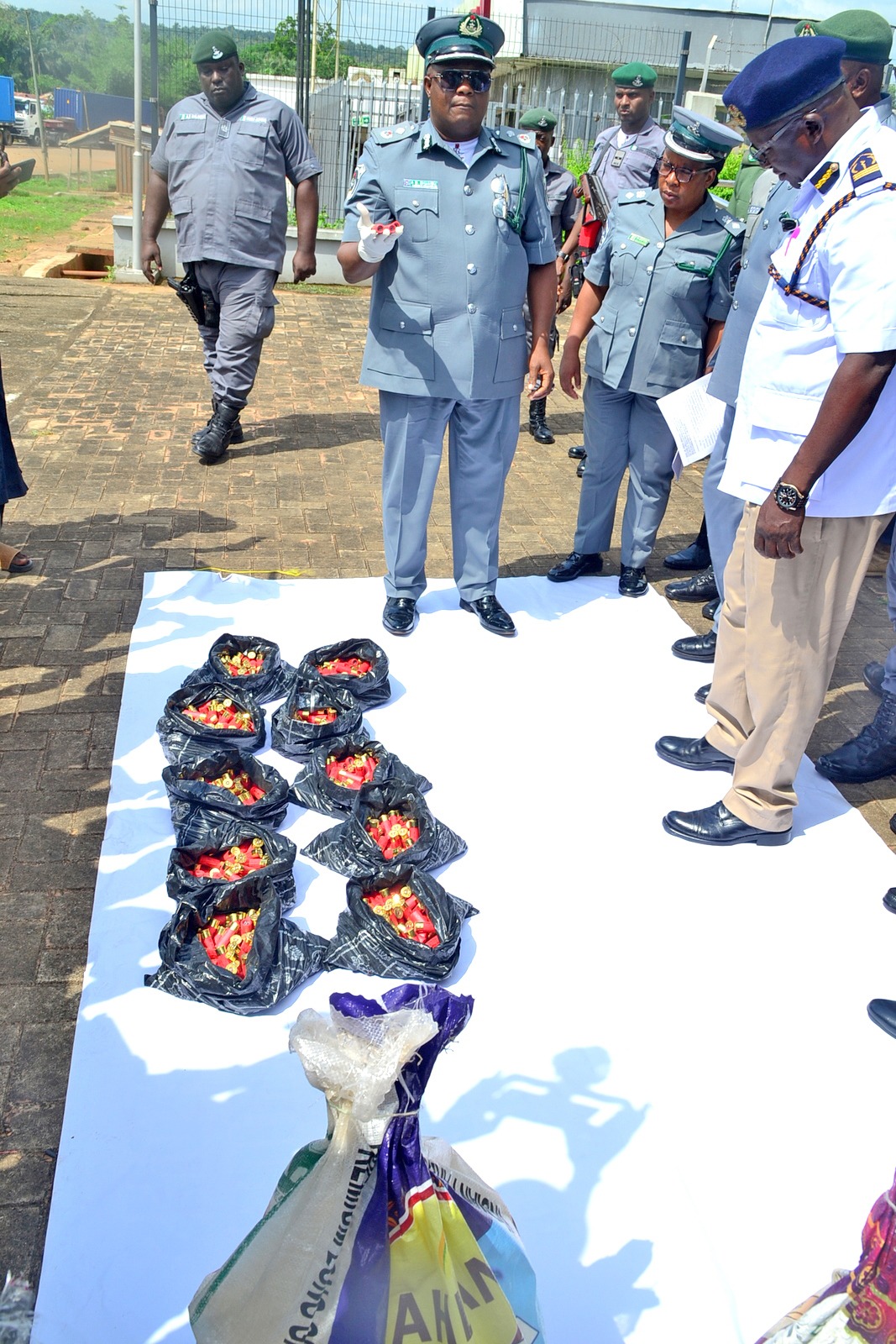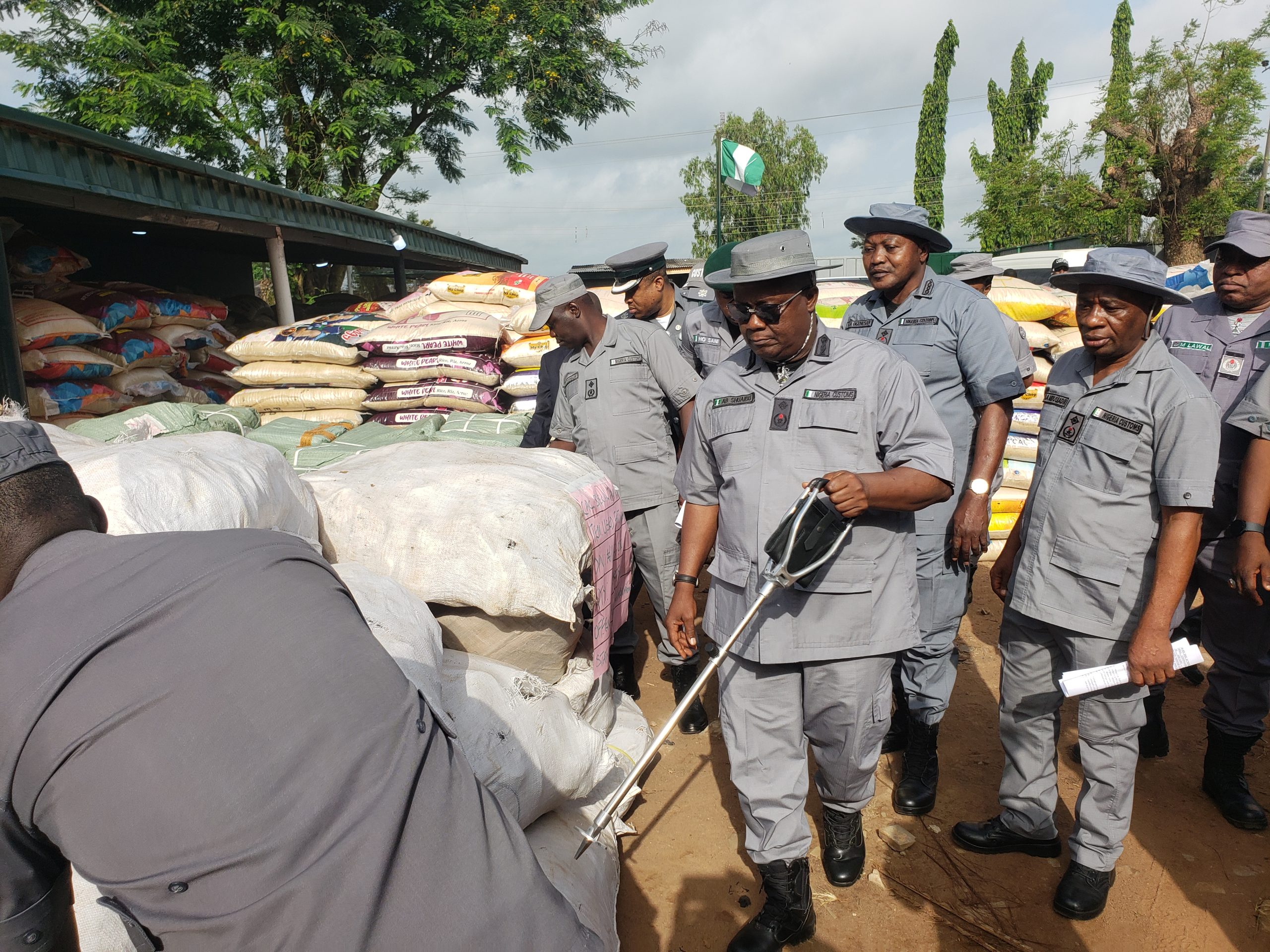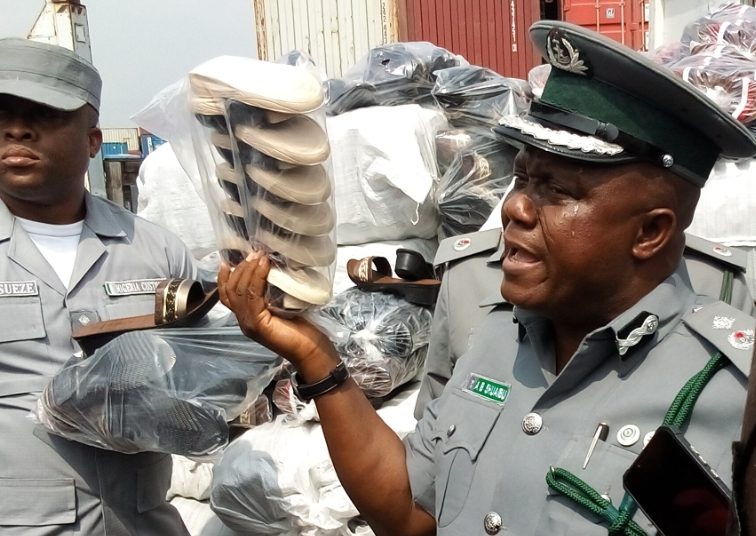Customs Report
‘Customs Revenue Target A Necessity’ – Shuaibu

The Nigeria Customs Service, NCS, Ogun 2 Command Area Controller, Deputy Comptroller Ahmadu Shuaibu has reacted to suggestions for the scrapping of the NCS annual revenue target regarded by industry operators as primitive and potentially anti-trade, while explaining the exigency of the vexatious instrument.
An uncommon result getter with cutting edge operational strategies, Shuaibu said with the right application of ICT and officers’ commitment and dexterity, he hopes to optimize the command’s excise collection.
He spoke on other industry issues including the massive but gradually socioeconomic growing prospect of the Guangdong Free Trade Zone.
By Eguono Odjegba
There have been so much concerns and worries about the 2022 customs revenue target, as a senior officer of the service, how realistic was the target?
Generally, revenue targets are projections, so is it with the 2022 target set for customs. Every revenue target is realizable if all hands are on deck, though the preamble l would have loved to give to the matter is that the Nigeria Customs Service is saddled with that responsibility. We hear so much complaint about the setting of target, but the reality is obvious, it is just because Nigeria is a developing economy. In developed world target is not given to customs, so customs in those climes mainly facilitates trade. But Nigeria is not there yet, so whereas target is given, those unhappy about the system will continue to insist that the role of trade facilitation will be somewhat hampered. But this administration is doing everything possible to maintain a safeguard, a trading balance that will offer importers and their agents and indeed the consuming general public, some succor. We must accept that all this is happening because government needs revenue from non oil sector to pay salaries and to carry out other state’s developmental projects. So whatever target is given is made realizable and this is the task given to the customs service. Maybe Nigerians need to understand that customs revenue target is a tax policy of government, where the customs is merely the collector. You also know that customs target like other revenue projections are subject to various factors, economic, fiscal, security, social stability etc.
Well stakeholders are also thinking that despite Nigeria Customs Service always hiding behind the claim that its job is to implement, there are cases the customs has initiated some of these policies and also deliberately suggests prohibitive annual revenue targets which relevant authorities merely approve; leaving the crude sector which is the mainstay of the economy to continue to flag and dwindle.
I want to disagree with that, Nigeria Customs Service don’t make laws, we implement government policies and programmes. Let me put it like this…the government of the day has so much confidence in the customs service and in the attempt to diversify the economy and bring in needed revenue to maintain and sustain governance. You will agree with me that if government believes that the crude sector has been failing in recent years either for lack of accountability, for reasons of oil bunkering and the subsidy issues, hence, government tasked itself on the way forward, it is the duty of every agency to comply with every task assigned to it. Thus to look at the non oil revenue sectors to fill the gap, and the agency that fortunately came to mind was the customs service; which has risen to the occasion.
But let us take another look at the established alibi by customs that its job is merely to implement policies, in view of the recent carbonated drinks tariff hike which it planned alone and forced down the throats of manufacturers and consumers.
It wasn’t customs management that planned it, that is where you people get it wrong…
It was of course the customs, l followed up the development, customs issued the white paper and defended it…
No it was not the customs…government now seeing that it needed more revenue, government sensing that the target given to customs must be met, decided in its own wisdom to reintroduce the carbonated drink into excise control.
We’re talking about the fact that it was the management of the customs that addressed the issue…

That was because of the directive given to the service to do so by the federal ministry of finance based on the fact that it is the statutory role of the customs service to collect excise duty on all goods manufactured in this country; manufacture that are under excise. So it is a misconception to say it was the customs service that formulated the new tariff on carbonated drink, customs don’t formulate policies, we implement.
As the controller in charge of Ogun 2 area command which is about the biggest excise industrial estate, would you say that the increment in carbonated drinks tariff has been efficiently and transparently collected since the reintroduction?
Yes l will say since the reintroduction in June this year, the grey areas have been sorted out jointly between us and the stakeholders, and so far, we have been winning their confidence knowing full well that they are contributing to the nation’s development. You know it is not easy to pay tax, but what we did was to let them know that it was not a war situation, that it is a patriotic duty that they must give to the government and by extension even the host communities where they work, what we refer to in the academia as the busiosocietality, which is the response of business to its immediate environment. Government makes laws, provides enabling environment, you are into production; you must pay little things to government so that government will continue to function and maintain security, infrastructure, roads etc.
What is your command’s potential in terms of annual and quarterly collectible revenue?
The potential of this command is great and if fully harnessed is capable of contributing immensely into the coffers of government. Here we have the Guangdong Free Trade Zone, which is not only about duty collection, it is about the industrialization of this country, and once technology is transferred it enhance productivity and development. So the whole potential may not be immediately visible but it is inherent and will manifest in the near future. Even currently what they are doing is massive, it has created huge employment for Nigerians and these people that brought their direct investment and nationals are on ground, they are all contributing to the socioeconomic development of the country. So we are looking at the situation where customs can contribute via duty collection of N3billion monthly.
There is this culture of not wanting to pay tax by people, how is the culture also playing out at the industrial scale within your command? Aren’t there excise operators likely running away from payment of taxes? What are you doing to chart such into the control system?
That is why in that context we engage in stakeholders meeting at intervals, ensure we secure their responses to continue to pay taxes. Mind you that no company can be incorporated or function in Nigeria without getting the National Agency for Foods and Drugs Administration Control, NAFDAC approval. We are in collaboration with NAFDAC, which supplies us with information of all the companies registered in Ogun State. So there is no hiding place for any operator. Beyond what we get from NAFDAC our searchlight is everywhere, so intelligence will revel anybody dodging the payment of taxes. If the majority of manufacturers are reporting to customs, it’s only a matter of time to pick out anyone involved in tax evasion; we are equal to the task.
There are experts’ views about the worrisome trend in the drop in the volume of importation, especially looking at September/October this year, are you still optimistic that the service can realize the 2022 revenue target?
Sometimes such drop is evidence in the improvement of the capacities in local production. That will be the basis for exports to improve and basis for the naira to become stronger against the international trade currency which is the dollar. That is the potential of the free trade zones, every government is interested in raising the capacities of its local products, earn improved foreign exchange and become less dependent on imports. Aside these, of course there are other factors, don’t forget that the general election is approaching. As for the realization of this year’s revenue target, it is not in my purview to compute, but what is really important is that targets help us to sit up and remain focus.
What is the revenue target for your command and efforts you have introduced to possibly surpass the set target which has become norm.
Our monthly target is in excess of N2billion, and by the special of God, we are equal to the task. Our mainstay effort is collaboration with the stakeholders, meeting and appealing, because it is not a war situation, it is the battle of heart and mind. We will be having meeting today for 11 o’clock, you can see most of them are already here, they are happy that we are here to assist one another.
What is your strategy to ensure that your command key into the management’s vision of reform and revenue increase?
We walk our talk; we are in tune with the CGC’s critical agenda of reform, restructuring and productivity. My team mates who are my officers and men have keyed in and are following. Mind you leadership is vital in any organization, ours is not n exception. We are a creation of law, we follow due process, customs activities are procedural and the extant laws will be followed meticulously; and this is the sum total message we preach.






























